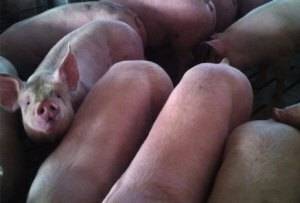What does a farmer do in winter? In addition to doing chores and plowing snow, I’ve been making my way through the stack of newspapers and magazines that got piled up during harvest. One article I read this weekend was “Pew Commission 5 years later” written by Tyler Harris and printed in the September 2013 issue of Wallaces Farmer.
While I believe Harris was trying to report the facts, his article got under my skin. I thought about titling today’s blog, “Trying to listen when steam is coming out of your ears!” I’m getting worked up again just thinking about Harris’ article, but I’ll do my best to give you the jest.
The Pew Commission on Industrial Farm Animal Production (PCIFAP) issued a report in 2008 entitled, “Putting Meat on the Table: Industrial Farm Animal Production in America.” It called for changes to meat production in the name of public health, environment, animal welfare, and the economics of rural communities. The Commission made recommendations against the use of antimicrobials fed to meat animals and proposed changes to current livestock waste management systems.
 Many of these recommendations were opposed by the National Pork Producers Council and the Animal Agricultural Alliance. Because these groups questioned the study’s objectivity, a follow up study was led by Robert Lawrence, director of the John Hopkins Center for a Livable Future. Results from that study were released this fall. Basically, this follow up study upholds the Pew recommendations from 2008, and Lawrence is quoted as saying, “… the urgency to implement them fully grows each day.”
Many of these recommendations were opposed by the National Pork Producers Council and the Animal Agricultural Alliance. Because these groups questioned the study’s objectivity, a follow up study was led by Robert Lawrence, director of the John Hopkins Center for a Livable Future. Results from that study were released this fall. Basically, this follow up study upholds the Pew recommendations from 2008, and Lawrence is quoted as saying, “… the urgency to implement them fully grows each day.”
I’m trying very hard to keep an open mind here, but the “Devil” is in the details! The PCIFAP consists of 15 commissioners “who bring individual expertise in diverse fields including public policy, agriculture, veterinary medicine, public health, animal welfare, the food industry, and rural society.” Until you read through the list of commissioners and research their backgrounds, one would think this group would represent experts on all sides of the issue. Not the case!
The makeup of this Commission is clearly one-sided. That’s why today I’m using my own experience to refute each recommendation the Commission made:
- The Commission’s first recommendation addresses antibiotics use within the livestock industry. Mainly, the Commission wants to stop use of all non-therapeutic antimicrobials. Fact is, a very small amount of antibiotics are used in this way. Antibiotics add to feed costs, so farmers don’t use them unless they’re needed. Plus, modern buildings are so much better for controlling disease that hogs get sick less frequently. When my hogs were raised outside, I was always medicating due to stress and exposure to stray animals and weather. No one has proved that resistance is coming from antibiotics used in this fashion.
- The Commission’s second recommendation concerns a government database and disease monitoring. In my own operation, I know where the pigs come from and what their history is. We already have a great system in Iowa to deal with any outbreak of disease, so we don’t need additional rules.
- In its third recommendation, the Commission addresses industrial waste from the “inflexible and broken system” that exists. Now this is way out of line! I agree there is not much flexibility with our current manure management plans. But calling manure an industrial waste is simply wrong! Manure is a valuable fertilizer, and no farmer wants to waste valuable inputs.
- Recommendation number 4 deals with animal welfare. There is a distinct different between treating animals humanely and treating them like a human! Farmers treat their animals humanely every day because we want the livestock’s environment as stress-free as possible. The whole premise behind modern production techniques is to give our animals the very best care possible! Following a recent snow storm, I stepped inside one of the modern barns and snapped a picture of a pen of pigs. The wind chill outside was at least 20 below zero, but my pigs were warm and cozy. As much as these experts want to return to the good old days, I would never wish that for my pigs!
- The Commission’s fifth recommendation calls for more state and federal regulations to “level playing field for all producers.” This is America, folks, where free enterprise and free choice are supposed to reign supreme! Let the free market – not government regs – rule. Leveling the playing field removes incentives from those who have figured out how to do a great job and gives advantage to those who are inefficient. If a producer wants to remain small, he must find a niche market – and many have. It’s not government’s job to decide the winners in business!
- The last point calls for increased government funding to expand and reform animal research. Last I knew, private companies were doing a pretty darn good job already!
The point I want to make is that the Pew study is very well funded and get a lot of attention, so it puts pressure on elected officials to make more rules that end up hampering business. More regulations leads to higher production costs, which leads to fewer investments by farmers and businesses, which leads to fewer jobs and higher food costs. We must remain diligent in protecting the great food system we already have in this country, which produces the safest cheapest food in the world!

